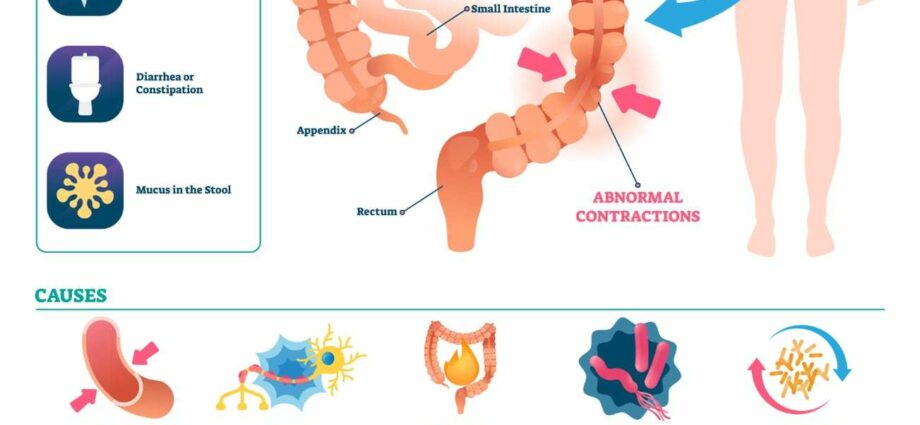Turinys
Dirgliosios žarnos sindromas
Le dirgliosios žarnos sindromas (IBS) taip pat pavadintas dirgliosios žarnos sindromas. In France, the term ” functional colopathy “. It is a digestive disorder which is characterized by discomfort or painful sensations in the stomach.
Visa tai nemalonumai are associated with changes in the speed of food passage through the colon, also called the large intestine (see diagram). Gear speeds that are too fast or, conversely, too slow will cause different symptoms. Thus, when the phases of contraction and relaxation of the intestinal muscles are faster or stronger than normal, the colon does not have time to absorb the water contained in food. This causes viduriavimas.
When the contractions are slower and weaker than normal, the colon absorbs too much fluid, which in turn causes pressure. Užkietėjimas. The stools are then hard and dry.
Generally, we distinguish 3 subkategorijos syndrome depending on the type of main symptoms.
- Syndrome with pain and diarrhea.
- Syndrome with pain and constipation.
- Syndrome with pain, diarrhea and constipation.
Ką tai liečia?
Le dirgliosios žarnos sindromas is a frequent disorder: it is the cause of 30% to 50% of consultations with a gastroenterologist.
This syndrome would affect 10% iki 20% the population of Western countries; it is mostly about moterys. However, it should be noted that this is an estimate because it is difficult to obtain reliable statistics. On the one hand, it seems that only 15% of people with the disease consult their doctor about it.28. On the other hand, there are 2 different diagnostic grids (Manning and Rome III), which influence the number of people considered to be suffering from irritable bowel syndrome.
evoliucija
This disorder appears gradually in Paaugliai ir jauni suaugusieji. In most cases, irritable bowel syndrome is lėtinis. However, those affected may experience periods of remisija more or less long. Their discomfort can appear every day for 1 week or 1 month, then disappear, or even last a lifetime. Only a minority of patients present with very bothersome symptoms.
Galimos komplikacijos
Unlike more serious bowel disease, such as ulcerative colitis and Crohn’s disease, irritable bowel syndrome does not cause inflammation, alter the structure of the intestinal lining, or increase blood pressure. risk of developing colorectal cancer. This is why irritable bowel syndrome is considered a funkcinis sutrikimas rather than as a disease.
Kita vertus, skausmas, diarrhea and the constipation it causes can become very bothersome.
Le dirgliosios žarnos sindromas can also seriously hamper the professional and social activities of those who suffer from it, impoverish their gyvenimo kokybė and lead to anxiety and depression.
Finally, it has been found that other disorders tend to be associated with this syndrome, such as painful periods, chronic fatigue syndrome and fibromyalgia. For the moment, we do not know the reason.
Kada kreiptis?
If the ailments are new, very bothersome or worrying, it may be helpful to see a doctor. Indeed, other health problems can give similar symptoms.
A medikų konsultacija is necessary in case of blood in the stool, fever, significant weight loss or uncontrollable diarrhea, especially if it also occurs at night.
Priežastys
The causes of this disorder are still unknown and are the subject of much research. Of them hipotezes are offered: either sufferers suffer from abnormal and painful contractions of the intestine, or they are more sensitive than normal to movements of the colon and rectum, usually imperceptible.
As women are more affected than men and their discomfort worsens during their period, some researchers believe that hormoniniai pokyčiai vaidinti vaidmenį.
According to some data, up to 25% of cases of irritable bowel syndrome occur after infekcija virškinimo trakto1,2. The hypothesis of an imbalance of the intestinal flora is also explored3.
In addition, some researchers believe that an abnormal level of serotonin in the digestive tract could be the cause of the syndrome. This could explain why many affected patients suffer from anxiety and depression. You should know that serotonin has a significant effect on mood and bowel movements4,5.
It is also possible that there is a link between irritable bowel syndrome and sexual or physical abuse experienced during childhood.
Stress was once thought to be a cause of this disorder, but it is not. On the other hand, it generally increases the symptoms (especially the pain).










